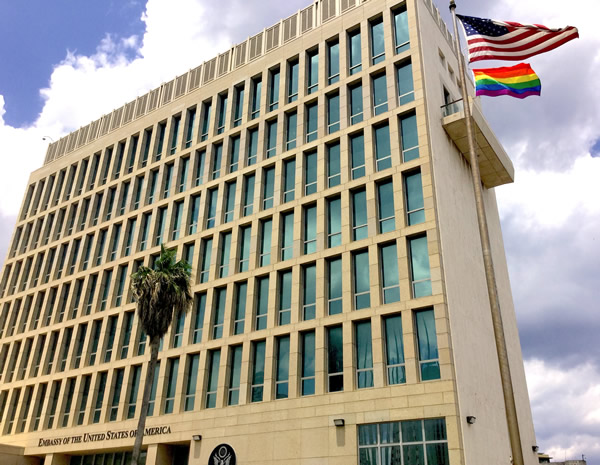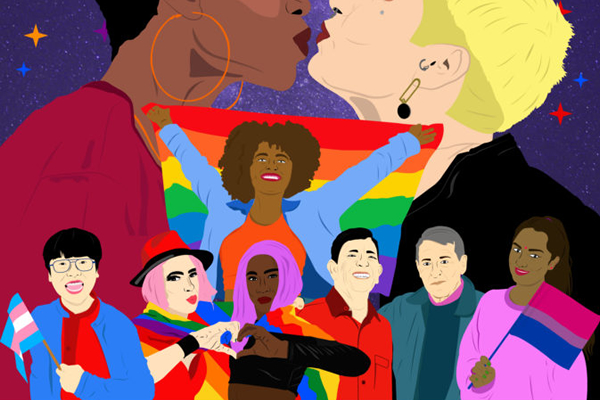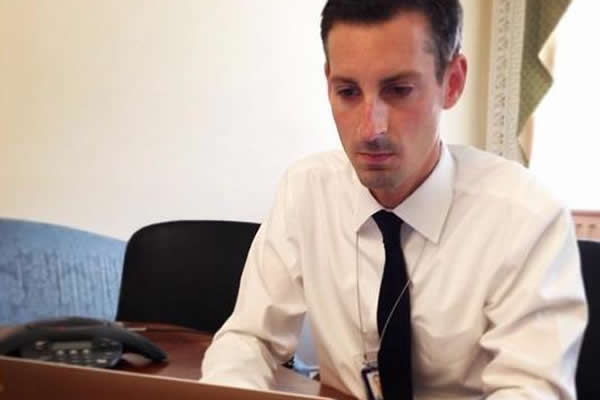News
Biden administration announces global LGBTQ rights priorities
Homosexuality remains criminalized in upwards of 70 countries

State Department spokesperson Ned Price on May 14 said the decriminalization of consensual same-sex sexual relations is one of the five priorities for the Biden administration in its efforts to promote LGBTQ rights abroad.
“The United States over the course of years has made some progress, but neither I, nor I think any objective observer should be satisfied with where we are,” Price told the Washington Blade during a telephone interview. “There’s a lot more work to do.”
President Biden in February signed a memorandum that committed the U.S. to promoting LGBTQ rights abroad. Price told the Blade the decriminalization of homosexuality is “one of the many reasons why” the White House issued it.
“It is one of the many reasons why Secretary Blinken is so focused on this issue as well,” said Price.
Homosexuality remains criminalized in nearly 70 countries around the world.
Saudi Arabia and Iran are among the handful of countries that impose the death penalty upon anyone found guilty of engaging in consensual same-sex sexual relations. Bhutan and Gabon are among the nations that have decriminalized homosexuality in recent years.
The Trump administration in 2019 tapped then-U.S. Ambassador to Germany Richard Grenell to lead a decriminalization initiative. Price declined to tell the Blade whether he feels the campaign was effective.
“Across the board I generally have a posture of not characterizing the last administration,” said Price. “I’ll leave them to speak to their record.”
Migration mitigation efforts must be ‘holistic’
Price told the Blade the Biden administration will also work to protect LGBTQ migrants and asylum seekers.
“When it comes to the (issue of) irregular migration, this is not just a challenge at our border,” he said. “This is fundamentally a challenge that starts in the region and if we are to address the migrant flows that reach our borders, we’re going to have to start in the region and that’s precisely what we’re doing.”
Activists in Honduras, El Salvador, Guatemala and other countries with whom the Blade has spoken say violence and discrimination based on gender identity and sexual orientation are among the factors that prompt LGBTQ people to flee their homes and travel to the U.S.
Price did not say whether any of the $4 billion in aid the Biden administration has pledged to spend in order to help mitigate the causes of migration from Central America’s Northern Triangle will specifically go to LGBTQ rights groups or HIV/AIDS service organizations. Vice President Kamala Harris late last month announced an additional $310 million in aid to “address” what Price described as “the root causes of irregular migration and to provide people with the confidence that they need not undertake the very dangerous journey north to the United States and that they can be confident in their lives in their home countries.”
“Oftentimes that is about economic opportunity, but there are cases in which it has more to do with discrimination and persecution,” Price told the Blade. “And so, we recognize that our approach to addressing those underlying drivers has to be holistic, given there are a range of factors and that’s why we’re working with a variety of groups on the ground and also understanding that marginalized communities, including the LGBTQI community, in the region, that there needs to be meaningful partnership there as well.”
“USAID (U.S. Agency for International Development) is deeply engaged in this work, the State Department is engaged in this work as well and will continue to be, knowing that if we’re going to make progress, if we’re going to address the underlying root causes of irregular migration, we need to attempt to address all of them,” he added.
Price told the Blade the administration’s three other global LGBTQ rights priorities are funding efforts “to protect human rights and to advance nondiscrimination around the world,” respond to anti-LGBTQ human rights abuses and “building coalitions and engaging international organizations in the fight against this discrimination.”
“We have said across the board that one of the pillars of our foreign policy is the recognition that, yes, the United States is the most powerful country on the face of the Earth,” said Price. “We have tremendous sway and influence the world over, but we also recognize that in every challenge in virtually every arena, we will be able to do more, we will be able to be more effective, we’ll be able to be more persuasive and act more decisively when we bring our allies and partners along with us and this administration has put a great deal of emphasis on our alliances, our partnerships, but also those like-minded, as we call them, partners.”
Price added the U.S. recognizes “the values we share with our closest partners in the world are incredibly important.”
“They provide us with a similar framework and a set of priorities on which to act and of course working together to protect, but also to promote the rights of LGBTQ populations around the world,” he told the Blade. “It is a core tenet of what we share with our like-minded allies and partners. You will see us doing this on a bilateral basis. You will see us doing this on a multilateral basis, within blocks and groupings, and also at the U.N. as well. We will seek to press this case in all of those contexts.”
Blinken issues IDAHOBiT statement
Price spoke with the Blade three days before the International Day Against Homophobia, Biphobia and Transphobia, which commemorates the World Health Organization’s 1990 decision to declassify homosexuality as a mental disorder. Blinken on Sunday in a statement acknowledged IDAHOBiT.
“The message of ‘Together: Resisting, Supporting, Healing!’ is especially poignant as this year’s IDAHOTB theme,” said Blinken. “Ending hatred and violence against LGBTQI+ persons requires collaborative action from us all.”
“The United States is doing its part,” he added. “Within the first weeks of his administration, President Biden issued a memorandum instructing all U.S. federal agencies working abroad to ‘ensure that U.S. diplomatic efforts and foreign assistance promote and protect the human rights of LGBTQI+ persons.’ And that important work is well underway.”
Blinken in his IDAHOBiT statement also referenced the same five priorities that Price discussed with the Blade.
“Working together, we can create a world that respects and celebrates the dignity of all individuals,” said Blinken. “It is in partnership that we will achieve our goal of a rights-respecting, inclusive society where no one lives in fear because of who they are or whom they love.”

(Photo courtesy of the International Day Against Homophobia, Biphobia and Transphobia committee)
Blinken in March announced the State Department has disbanded the Commission on Unalienable Rights, a human rights advisory committee his predecessor created that LGBTQ activists sharply criticized.
He announced last month the State Department will once again allow U.S. diplomatic installations to fly the Pride flag. The position of special U.S. envoy for the promotion of LGBTQ rights abroad within the State Department’s Bureau of Democracy, Human Rights and Labor has remained vacant since 2017, but Blinken has pledged to make it an ambassador level post.
The Trump administration in 2018 withdrew from the U.N. Human Rights Council, which in recent years has emerged as a vocal champion of LGBTQ rights around the world. Blinken in February announced the U.S. will “reengage” with it.
Price is the first openly gay State Department spokesperson.
“I know that every time I say something I am speaking on behalf of the Department of State, on behalf of Secretary Blinken, on behalf of the U.S. government, sometimes on behalf of President Biden,” he told the Blade. “I’m not sure what I fully appreciated before actually coming into this job is that I’m actually speaking to the LGBTQ community around the world.”
Price said he received emails and tweets from around the world after the Biden transition team announced his appointment. Price told the Blade that some people were “seemingly in shock,” while others had “some degree of delight that a member of the LGBTQ community would be put in such a public facing role in an American administration.”
“I understand this work is not about me,” Price told the Blade. “I’m never offering my personal opinion, but I think that I’ve come to understand that there is meaning in having an openly gay man in a role like this. There is meaning for the LGBTQ community at home, but especially in this role there is meaning and value attached to having that be the case around the world, and especially around the world where members of the community are routinely and often times systematically persecuted.”

State Department spokesperson Ned Price
Kansas
ACLU sues Kansas over law invalidating trans residents’ IDs
A new Kansas bill requires transgender residents to have their driver’s licenses reflect their sex assigned at birth, invalidating current licenses.

Transgender people across Kansas received letters in the mail on Wednesday demanding the immediate surrender of their driver’s licenses following passage of one of the harshest transgender bathroom bans in the nation. Now the American Civil Liberties Union is filing a lawsuit to block the ban and protect transgender residents from what advocates describe as “sweeping” and “punitive” consequences.
Independent journalist Erin Reed broke the story Wednesday after lawmakers approved House Substitute for Senate Bill 244. In her reporting, Reed included a photo of the letter sent to transgender Kansans, requiring them to obtain a driver’s license that reflects their sex assigned at birth rather than the gender with which they identify.
According to the reporting, transgender Kansans must surrender their driver’s licenses and that their current credentials — regardless of expiration date — will be considered invalid upon the law’s publication. The move effectively nullifies previously issued identification documents, creating immediate uncertainty for those impacted.
House Substitute for Senate Bill 244 also stipulates that any transgender person caught driving without a valid license could face a class B misdemeanor, punishable by up to six months in jail and a $1,000 fine. That potential penalty adds a criminal dimension to what began as an administrative action. It also compounds the legal risks for transgender Kansans, as the state already requires county jails to house inmates according to sex assigned at birth — a policy that advocates say can place transgender detainees at heightened risk.
Beyond identification issues, SB 244 not only bans transgender people from using restrooms that match their gender identity in government buildings — including libraries, courthouses, state parks, hospitals, and interstate rest stops — with the possibility for criminal penalties, but also allows for what critics have described as a “bathroom bounty hunter” provision. The measure permits anyone who encounters a transgender person in a restroom — including potentially in private businesses — to sue them for large sums of money, dramatically expanding the scope of enforcement beyond government authorities.
The lawsuit challenging SB 244 was filed today in the District Court of Douglas County on behalf of anonymous plaintiffs Daniel Doe and Matthew Moe by the American Civil Liberties Union, the ACLU of Kansas, and Ballard Spahr LLP. The complaint argues that SB 244 violates the Kansas Constitution’s protections for personal autonomy, privacy, equality under the law, due process, and freedom of speech.
Additionally, the American Civil Liberties Union filed a temporary restraining order on behalf of the anonymous plaintiffs, arguing that the order — followed by a temporary injunction — is necessary to prevent the “irreparable harm” that would result from SB 244.
State Rep. Abi Boatman, a Wichita Democrat and the only transgender member of the Kansas Legislature, told the Kansas City Star on Wednesday that “persecution is the point.”
“This legislation is a direct attack on the dignity and humanity of transgender Kansans,” said Monica Bennett, legal director of the ACLU of Kansas. “It undermines our state’s strong constitutional protections against government overreach and persecution.”
“SB 244 is a cruel and craven threat to public safety all in the name of fostering fear, division, and paranoia,” said Harper Seldin, senior staff attorney for the ACLU’s LGBTQ & HIV Rights Project. “The invalidation of state-issued IDs threatens to out transgender people against their will every time they apply for a job, rent an apartment, or interact with police. Taken as a whole, SB 244 is a transparent attempt to deny transgender people autonomy over their own identities and push them out of public life altogether.”
“SB 244 presents a state-sanctioned attack on transgender people aimed at silencing, dehumanizing, and alienating Kansans whose gender identity does not conform to the state legislature’s preferences,” said Heather St. Clair, a Ballard Spahr litigator working on the case. “Ballard Spahr is committed to standing with the ACLU and the plaintiffs in fighting on behalf of transgender Kansans for a remedy against the injustices presented by SB 244, and is dedicated to protecting the constitutional rights jeopardized by this new law.”
National
After layoffs at Advocate, parent company acquires ‘Them’ from Conde Nast
Top editorial staff let go last week

Former staff members at the Advocate and Out magazines revealed that parent company Equalpride laid off a number of employees late last week.
Those let go included Advocate editor-in-chief Alex Cooper, Pride.com editor-in-chief Rachel Shatto, brand partnerships manager Erin Manley, community editor Marie-Adélina de la Ferriére, and Out magazine staff writers Moises Mendez and Bernardo Sim, according to a report in Hollywood Reporter.
Cooper, who joined the company in 2021, posted to social media that, “Few people have had the privilege of leading this legendary LGBTQ+ news outlet, and I’m deeply honored to have been one of them. To my team: thank you for the last four years. You’ve been the best. For those also affected today, please let me know how I can support you.”
The Advocate’s PR firm when reached by the Blade said it no longer represents the company. Emails to the Advocate went unanswered.
Equalpride on Friday announced it acquired “Them,” a digital LGBTQ outlet founded in 2017 by Conde Nast.
“Equalpride exists to elevate, celebrate and protect LGBTQ+ storytelling at scale,” Equalpride CEO Mark Berryhill said according to Hollywood Reporter. “By combining the strengths of our brands with this respected digital platform, we’re creating a unified ecosystem that delivers even more impact for our audiences, advertisers, and community partners.”
It’s not clear if “Them” staff would take over editorial responsibilities for the Advocate and Out.

In an official statement released at the reveal event Capital Pride Alliance described its just announced 2026 Pride theme of “Exist, Resist, Have the Audacity” as a “bold declaration affirming the presence, resilience, and courage of LGBTQ+ people around the world.”
The statement adds, “Grounded in the undeniable truth that our existence is not up for debate, this year’s theme calls on the community to live loudly and proudly, stand firm against injustice and erasure, and embody the collective strength that has always defined the LGBTQ+ community.”
In a reference to the impact of the hostile political climate, the statement says, “In a time when LGBTQ+ rights and history continue to face challenges, especially in our Nation’s Capital, where policy and public discourse shape the future of our country, together, we must ensure that our voices are visible, heard, and unapologetically centered.”
The statement also quotes Capital Pride Alliance CEO and President Ryan Bos’s message at the Reveal event: “This year’s theme is both a declaration and a demand,” Bos said. “Exist, Resist, Have Audacity! reflects the resilience of our community and our responsibility to protect the progress we’ve made. As we look toward our nation’s 250th anniversary, we affirm that LGBTQ+ people have always been and always will be part of the United States’s history, and we will continue shaping its future with strength and resolve,” he concluded.



















